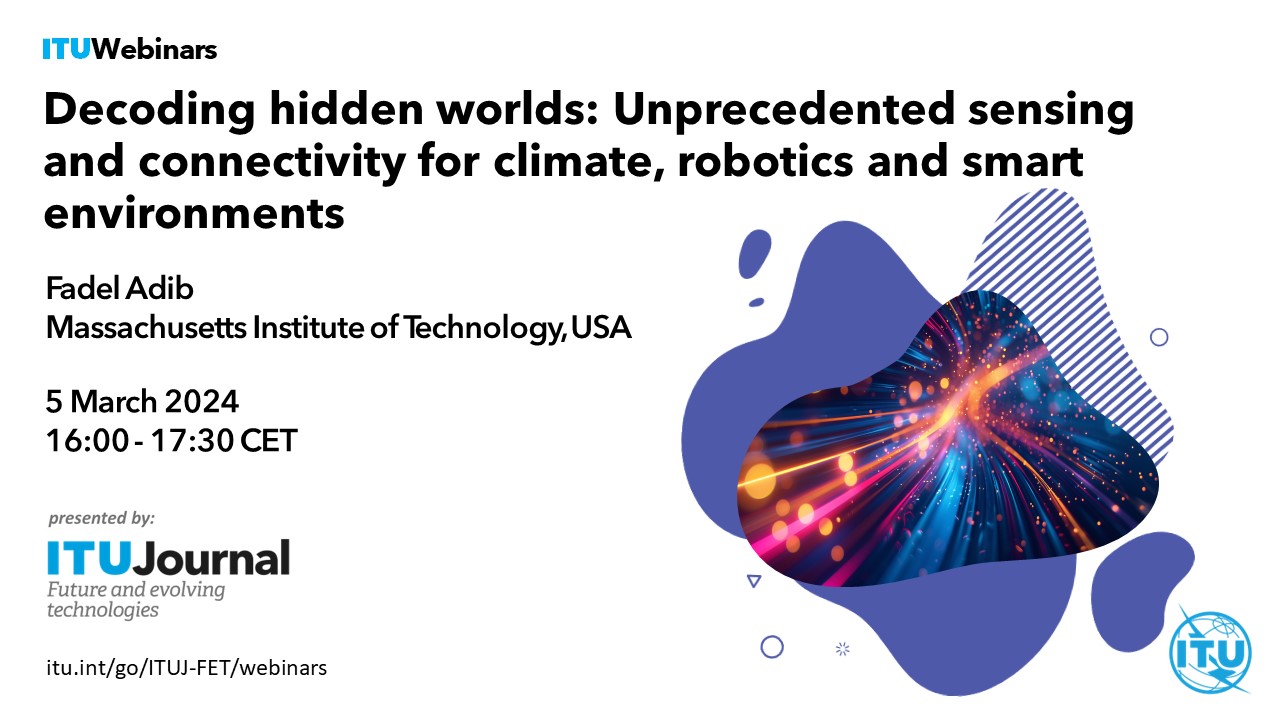
TALK
This talk covered a new generation of technologies that can sense, connect, and perceive the physical world in unprecedented ways. These technologies can uncover hidden worlds around us, promising transformative impact on areas spanning climate change monitoring, ocean mapping, healthcare, food security, supply chain, and even extraterrestrial exploration.
The talk covered four core technologies invented by Prof. Adib and his team. The first is an ocean internet-of-things (IoT) that uses battery-free sensors for climate change monitoring, marine life discovery, and seafood production (aquaculture). The second is a new perception technology that enables robots to sense and manipulate hidden objects. The third is a new augmented reality headset with "X-ray vision”, which extends human perception beyond line-of-sight. The fourth is a wireless sensing technology that can “see through walls” and monitor people’s vital signs (including their breathing, heart rate, and emotions), enabling smart environments that sense humans requiring any contact with the human body.
The talk touched on the journey of these technologies from their inception at MIT to international collaborations and startups that are translating them to real-world impact in areas spanning healthcare, climate change, and supply chain.
WISDOM CORNER: LIVE LIFE LESSONS
Participants had the chance to hear from Prof. Adib about his impactful life lessons over the years as well as his advice to young researchers in the field of information and communication technologies.
|
SPEAKER:
Fadel Adib, Massachusetts Institute of Technology, USA
Fadel Adib is an Associate Professor in the MIT Media Lab and the Department of Electrical Engineering and Computer Science. He is the founding director of the Signal Kinetics group, which invents wireless and sensor technologies for climate, health, robotics, and smart environments. His research has led to multiple startups, and he is currently the founder & CEO of Cartesian Systems, a spinoff from his lab that focuses on mapping the physical world at unprecedented scale. Adib was named by
Technology Review as one of the world’s top 35 innovators under 35 and by Forbes as 30 under 30. His research on wireless sensing (X-ray vision) was recognized as one of the 50 ways MIT has transformed Computer Science, and his work on robotic perception (Finder of Lost Things) was named one of the
103 Ways MIT is Making a Better World. Adib’s commercialized technologies have been used to monitor thousands of patients with Alzheimer’s, Parkinson’s, and COVID-19, and he has had the honor to present his work to multiple heads of state, including President Obama at the White House. Adib is also the recipient of various awards including the
NSF CAREER Award (2019), the
ONR Young Investigator Award (2019), the
ONR Early Career Grant (2020), the
Google Faculty Research Award (2017), the
Sloan Research Fellowship (2021), the
ACM SIGMOBILE Rockstar Award (2022), and the
GAM “Genius” Award (2023), and his papers have won awards for best papers, demos, and highlights at premier academic venues including
ACM SIGCOMM, ACM MobiCom, ACM CHI, IEEE RFID, Nature Electronics, and Nature Communications. Adib received his Bachelor’s from the American University of Beirut (2011) and his Ph.D. from MIT (2016), where his thesis won the
Sprowls Award for Best Doctoral Dissertation at MIT and the
ACM SIGMOBILE Doctoral Dissertation Award.
|

|
MODERATOR: Ian F. Akyildiz, ITU J-FET Editor-in-Chief and Truva Inc., USA
|
WATCH RECORDING
